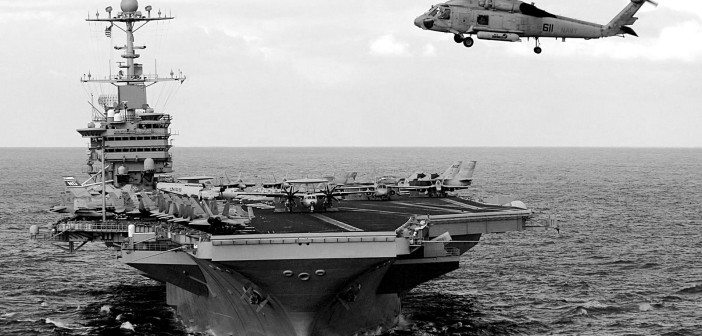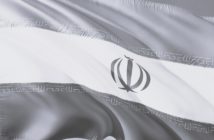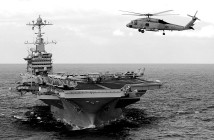This analysis is an attempt to study the Persian Gulf region security system and the challenges that are facing it, as well as what the effects of the Persian Gulf region are on the region and the world – being a strategic and important area, in terms of security and energy.
To better explain the topic, we should at first analyse the geopolitical regional situation and then study the political situation of the countries.
The Persian Gulf region is Arabic-Persian; and the Islamic Republic of Iran, which borders with water for its greatest part, is an important country in the region given its strategic importance at the Hormuz Strait and governing the large country of Iran.
Energy is a key point in this unique region because large amounts of energy resources are located in this area and are of great importance to the energy supply of different countries. The location of Persian Gulf region as a crossroads between cultures, the West and the East, has lead to special attention being given to the region by various great powers at different times.
We can refer to the Portuguese presence in the 19th century and then the British presence, under the pretext of fighting against piracy. But, after World War II, the United States had a strong presence in region. When the UK retreated in 1968 the US tried to replace the UK. Involvement of the United States in the Vietnam War, resulted in the country’s containment policy in the 1970. While Iraq was a confederate state of the Soviet Union, the situation of the area became even more complicated due to the Islamic revolution of Iran, which changed the balance of power in the region. The Islamic revolution of Iran changed the nature of Iran entirely and led to realignment: Iraq, previously an enemy, was being considered as a potential confederate of America.
After the Iran-Iraq war ended and Kuwait was occupied by Iraq, the area entered into a new phase – a phase in which security was affected by how the United States viewed the region, following the events of September 11. What followed was the fight against terrorism and the war in Afghanistan and Iraq.
The next question is: with respect to the relative stability in the region after the Iraq war, what will the US’s next policy be?
What policies and approaches will countries adopt towards the region? And such questions lead researchers to think about how the future of the Persian Gulf region will pan out and how the existing issues will develop, not least with respect to regional stability.
The basic challenge for the region is derived from ideological issues and border problems between countries from within the region and big powers pushing from outside – due to energetic matters.
The area has the largest oil and gas reserves in the world. In terms of energy (two-thirds of proven oil reserve and one third of natural gas reserves), industrial countries look at the region, in particular to further their growth. This can be a strong reason to influence other countries in the region – some analysts even think that wars and unrests are provoked in order to provide energy and more resources. For example, the issues of chemical weapons found in Iraq – although none were found, some similar issue will always exist as a pretext for the presence of foreign countries in the Persian Gulf and its direct vicinity.
In any case, energy security in the Gulf region has an undeniable role to play in advancing the global economy and the industrialised world.
With respect to the abovementioned cases, the importance of the Gulf region and its status is determined by how to assess the security issue in the area. Some theoretical explanations regarding the Persian Gulf security arrangements present different concepts, all applicable depending on the point of view, including a traditional approach, a hegemonic approach and a common security approach.
In the nature of the region, countries also have deep problems between them. It can be said that a traditional approach typically drives the region towards stability, because a hegemonic pattern increasingly emphasises the military aspect and typically demands a distinction between enemies and friends. With regard to the structure and nature of the governments of the region, this is difficult to coordinate, due to frequent changes.
And especially in the case of the Arabs; they have always taken care not to have any obligations towards any one – not even to each other. Throughout history, we can see their different attitude and to constrain instability via a participatory approach does not seem feasible due to historical, ideological and natural problems between most of the countries, as well as the role of ambition and power.
A traditional approach may be a suitable solution for the region’s security – an approach that creates a mutual understanding and creates a common interest considering that nowadays issues go across borders and countries can cooperate with each other according to common interests.
Aside from all of these topics, approaches and theoretical research trying to explain the situation, we should acknowledge that due to the Persian Gulf region and the structure of the countries, with the involvement of foreign powers and the abovementioned importance of the regions to those, the security arrangements mentioned are so complex and constantly changing because of different reasons.
But now, a general tendency towards an American view and policy-making within the region is appearing as increasingly important. This is due to the need for the states in the region to think about survival, due to domestic problems including legitimacy crises within their realms. Nonetheless it can, be said that the Islamic Republic of Iran is excluded from this trend and has always been after the Islamic revolution; using an independent policy on most issues.
The United States have always been following their own aims within the region, including security within energy transfer, maintaining a good relationship with the Arabs and addressing the lack of influence and power of the US in the region. Pursuing these goals, the US only have limited to no consideration for the region’s countries and it can be said that cooperation of other countries, especially European, in the Persian Gulf region is because of the energy issue. Because the European economy is dependent on the Gulf region’s energy and energy and security is supplied only via US involvement, the US can guarantee this security for the Europeans and support their needed energy – hence holding a powerful lever against the Europeans.
In general, with regard to the basic and important challenges in the Persian Gulf region we can point out the following issues: the cross-border and ideological problems, the presence of the great powers, especially the United States and the issue of Hamas and Israel, destabilising the Muslim world.
Cross-border problems are caused by the melting pot of countries in the area, sometimes competing for energy resources. Ideological problems are driven by the struggle between the two branches of Islam (namely Sunni and Shia) that exist since the very beginnings of Islam. The reasons for the presence of the United States and other powers have been mentioned, but inrecent years other important issues involving country in this region, such as the issue of Palestine and the existence of Israel has brought with it much disagreement and many problems for the region.
As we saw, during Israel’s presence in the region, Arabs always have had multiple disagreements on this issue and there is no unanimous position within the Arab world. As long as these countries do not have a common view on this topic –and a view that is not arising from the issue of correlation –Israel and Hamas will continue being a great challenge for the countries of the region.
In this regard, it can be said that only the Islamic Republic of Iran has a stable position regarding the Palestinian issue and in this regard, Iran can be a model for other states in the region.
The leadership of the Islamic world is another important issue that needs to be discussed and the problem of two great powers in region (namely Iran and Saudi Arabia) provides a challenge to clear leadership. This matter has always existed in history. However it can be said that the leadership of the Islamic world is an important issue, regarding the discrepancy between countries that is due to a lack of solidarity and common vision of the countries in the region.
With respect to the topics mentioned the other fundamental question is, which approach should be adopted by the countries that can drive security arrangements towards stability and bring peaceful symbiosis between countries, away from any challenge and conflict?
In my opinion, reaching a common vision and a peaceful atmosphere, along with peace in the region requires a realistic vision. Gulf countries have to keep away from any external pressure in order to find social security– something, which Gulf countries are responsible for. No conflict in the region may be considered as an ideal, but reducing the number of conflicts is possible – the Gulf countries need to understand that the stability of the Gulf region has benefits for all countries in the region and this stability can exist each country follows a vision to change and to cooperate with each other – away from any ideological conflicts.
But there is one big threat to such a vision: Arabs don’t trust Iranians and Iranians don’t trust Arabs, and this distrust allows other powers to abuse from this condition.
As mentioned before, the proposed solution of this article is reciprocal understanding of the countries, common vision toward issues, attention to the issue of energy as a field of cooperation between the countries; and that countries should supply their own safety, rather than other countries doing it for them.
As long as we do not pay attention to these issues and there is not realistic vision away from any negative mentality, the Persian Gulf region will always face this basic challenge.
On a final note, the stability of the Persian Gulf and the security of this region are related to the stability inside the countries- this bidirectional relationship exists and needs to be taken into account.
But some countries, especially the great powers, do not seem to seek stability: they always make trouble, in their own interests…
به نام خدا
موضوع: نظام امنیتی خلیج فارس و چالش های پیش رو
هادی نصیری[1]
تحلیل حاضر تلاشی است برای بررسی نظام امنیتی منطقه خلیج فارس و چالش های پیش روی این منطقه، اینکه منطقه خلیج فارس به عنوان یک منطقه استراتژیک و مهمه هم از منظر امنیتی و هم از نظر انرژی چه تاثیراتی راه در کشور های منطقه و جهان دارد، برای تبیین بهتر موضوع ابتدا باید موقعیت ژئوپلتیکی منطقه و پس از آن باید موقعیت سیاسی کشور ها را مورد بررسی قرار دهیم.
منطقه خلیج فارس یک منطقه عربی – ایرانی میباشد و جمهوري اسلامي ايران به عنوان یک کشور مهم در منطقه بی ترین مرز آبی را در خلیج فارس داراست و به این موضوع باید تنگه هرمز و مدیریت ایران را اضافه کنیم، انرژی در این منطقه منحصر به فرد یک نکته کلیدی محسوب میشود زیرا بیشترین ذخایر انرژی در این منطقه قرار دارد و با توجه به اهمیت مسئله انرژی برای کشور های مختلف به ویژه کشور های شمال این موضوع موقعیت منطقه خلیج فارس را در بین مناطق دیگر جهان در حالت ویژه ای قرار داده است. و قدرت های بزرگ در دوره های مختلف توجه ویژه ای را به این منطقه داشته اند.
می توانیم به حضور پرتغالی ها در قرن 19 و حضور بریتانیا را در منطقه به بهانه مبارزه با دزدی دریایی اشاره کنیم، ولی پس از جنگ جهانی دوم ایالات متحده آمریکا حضور پر رنگ تری در منطقه داشته است و با عقب نشینی انگلستان در سال 1968 آمریکا کوشید تا جای خالی این کشور را در منطقه پر کند، با درگیر ی آمریکا در جنگ ویتنام سیاست دو ستونی توسط این کشور در دهه 1970 شکل گرفت این در حالی بود که عراق نیز در منطقه به عنوان یک هم پیمان برای شوروی محسوب می شد. با بروز انقلاب اسلامی ایران شرایط منطقه پیچیده تر گردید و توازن قدرت در منطقه با توجه به ماهیت انقلاب اسلامی ایران تغییر کرد و عراق به عنوان کشوری مطرح شد که حامی جدید و هم پیمان آمریکا محسوب می شد و پس از آن سیاست مهار دو جانبه مطرح شد، پس از اتمام جنگ ایران و عراق و اشغال کویت توسط عراق تهدیدات منطقه وارد فاز جدیدی شد، این مرحله از مسائل امنیتی با حادثه 11 سپتامبر نگاه آمریکا به منطقه را دوباره تغییر داد و مسائلی مانند مبارزه با تروریسم و جنگ پیش دستانه در افغانستان و عراق تجربه شد، سوال ا صلی اینجاست سیاست بعدی آمریکا با توجه به ثبات نسبی منطقه پس از جنگ عراق به چه صورت خواهد بود؟ چه سیاست ها و رهیافت هایی از سوی کشور ها در خصوص منطقه دنبال خواهد شد؟ و سوالاتی از این قبیل که پاسخ به آن ها نیاز به تامل دارد و به طور مشخص آینده منطقه خلیج فارس و مسائل موجود در آن همواره ذهن پژوهشگران را به خود مشغول خواهد کرد و این موضوع نشان از اهمیت آن دارد و ثبات نسبی در منطقه و رسیدن به این ثبات همواره دغدغه این پژوهشگران محسوب میشود.
چالش های اساسی منطقه همواره از مشکلات ایدئولوژیک و مرزی بین کشور ها از داخل و فشار قدرت های بزرگ به دلیل تامین انرژی و امنیت آن ناشی میشود و این مسائل که منطقه را به عنوان یک منطقه امنیتی تبدیل کرده اند، و این دلایل هستند که همواره ثابت منطقه را با چالش مواجه ساخته اند.
همانطور که اشاره شد منطقه از لحاظ انرژی، بیشترین ذخایر نفت و گاز جهان (دو سوم ذخایر اثبات شده نفت و 1 سوم ذخایر گاز طبیعی) را در خود جای داده است و کشور های صنعتی برای استمرار رشد خود همواره با دید خاصی به منطقه نگاه میکنند، و این موضوع می تواند دلیل محکمی برای نفوذ کشور های دیگر در منطقه باشد، حتی برخی تحلیل گران جنگ های منطقه و ناآرامی های منطقه را در راستای تامین انرژی می دانند. با توجه به این که به عنوان مثال در عراق هیچ وقت تسلیحات شیمیایی یافت نشد و مواردی از این قبیل بوده اند که همواره بهانه ای برای حضور کشور های خارج از منطقه در خلیج فارس و اطراف آن محسوب میشود.
به هر حال امنیت انرژی در منطقه خلیج فارس برای پیشبرد اقتصاد جهانی و جهان صنعتی نقشی غیر قابل انکار دارد.
با توجه به موارد ذکر شده اهمیت منطقه خلیج فارس و وضعیت آن مشخص گردید، ولی اگر بخواهیم با یک تبیین نظری مسئله امنیت در منطقه را مورد ارزیابی قرار دهیم می توانیم چند نظریه را در خصوص ترتیبات امنیتی خلیج فارس ذکر کنیم که هر کدام می تواند با توجه به نوع وضعیت قابل اجرا باشند، این مفاهیم یا رهیافت های نظری عبارتند از 1- رهیافت سنتی 2- رهیافت هژمونیک و 3- رهیافت امنیت مشترک
با توجه به ماهیت کشور های منطقه و همچنین مشکلات عمیقی که بین آن ها وجود دارد می توان عنوان کرد که رهیافت سنتی در خصوص امنیت به نوعی منطقه را به سمت ثبات سوق خواهد داد، زیرا الگوی هژمونیک بیشتر بر جنبه نظامی تاکید دارد و به نوعی خواستار صفی از دشمنان و دوستان است که این موضوع همانطور که گفته شد با توجه به ساختار و ماهیت دولت های منطقه به نوعی همواره درحال تغییر است و به خصوص در خصوص اعراب همواره شاهد بودیم که حتی هیچ تعهدی نسبت به یکدیگر نیز ندارند و در طول تاریخ شاهد نگرش های مختلف و بی ثبات آن ها بوده ایم، رهیافت مشارکتی نیز به دلیل وجود مشکلات تاریخ ی، هویتی و ایدئولوژیک بین اکثر کشور های منطقه و قدرت طلبی هر یک از کشور ها می توان گفت که کاربرد چندانی نمی تواند داشته باشد.
و طی رهیافت سنتی به نوعی می تواند راه حلی مناسب برای امنیت منطقه محسوب گردد، رهیافتی که بتواند یک درک متقابل را به وجود آورد و با توجه به مسائل روز کشور ها بتوانند یک نوع منافع مشترک را به وجود آورده و کشور ها در راستای یک منافع مشترک بتواند با یکدیگر همکاری کنند.
گذشته از همه ی این مباحث و رهیافت ها و تبیین نظری پژوهش باید اذعان کرد که منطقه خلیج فارس و ساختار کشور ها در آن و نوع نگاه قدرت های بزرگ به این منطقه یک منطقه خالص میباشد، و با توجه به اهمیت داشتن منطقه و دلایل ذکر شده ترتیبات امنیتی آن نیز بسیار پیچیده و همواره در طول تاریخ به دلایل مختلف درحال تغییر است. ولی درحال حاضر نوع نگاه و سیاست های آمریکا در خصوص منطقه بسیار مهم تلقی میشود و کشور های منطقه به دلایل مختلف از جمله مشکلات داخلی و بحران مشروعیت در داخل و محیط بین المللی برای بقای خود با سیاست های آمریکا همسو میشوند البته می توان ادعا کرد جمهوري اسلامي ايران از این امر مستثنی میباشد و همواره پس از انقلاب اسلامی سیاست های مستقلی را در پیش گرفته است. آمریکا همواره اهداف خاص مد نظر خود را در منطقه دنبال می کند که می توان به مواردی از قبیل امنیت در انتقال انرژی، حفظ رابطه خوب با اعراب، عدم نفوذ و به وجود آمدن قدرتی نظیر آمریکا در منطقه و اهدافی از این قبیل که فقط منافع ایالات متحده را دنبال میکنند و هیچ توجهی به کشور های منطقه نمی شود و به نوعی می توان ادعا کرد که همکاری دیگر کشور ها به خصوص اروپایی ها در منطقه خلیج فارس با آمریکا به دلیل بحث انرژی میباشد زیرا اقتصاد اروپا نیز به انرژی منطقه خلیج فارس و ا بسته بود و تامین انرژی و امنیت آن برای اروپایی ها هم اکنون فقط از مسیر آمریکا عبور می کند و فقط آمریکا است که می تواند این امنیت را برای انرژی اروپا تضمین کرده و انرژی مورد نیاز آن ها را تامین نماید، و همواره شاهد بودیم که این موضوع به عنوان یک اهرم فشار در دست آمریکا بر علیه اروپایی ها بوده است.
در کل در خصوص چالش های اساسی و همه در منطقه خلیج فارس را می توان به موارد زیر اشاره کرد. مشکلات مرزی، مشکلات ایدئولوژیک حضور قدرت های بزرگ به خصوص آمریکا، مسئله حماس و اسرائیل، رهبری جهان اسلام و مشکلات مرزی از نزدیکی کشور ها به همدیگر و استفاده از منابع انرژی ناشی میشود، مشکلات ایدئولوژیک هم از وجود دو شاخه اسلامی سنی و شیعه در منطقه ناشی میشود که همواره در طول تاریخ اسلام وجود داشته و امروزه نیز به دلیل وجود شیعیان و سنی ها در کشور های حوزه خلیج فارس در برخی مواقع شاهد تعارضات ایدئولوژیک هستیم، دلیل حضور آمریکا و قدرت های دیگر نیز در مباحث قبلی توضیح داده شد، و اما مسئله مهم دیگری که در چند سال اخیر کشور های منطقه را به خود درگیر ساخته است مسئله فلسطین وجود اسرائیل در همسایگی کشور های حوزه خلیج فارس می باشد که همواره مشکلات زیادی را برای منطقه پدید آورده است، نوع نگاه به اسرائیل از سوی ارعاب و تغییر در نگرش این کشور ها نسبت به این رژیم همواره از وارد مهم مورد بحث بوده است. همانطور که شاهد بودیم در طول حضور اسرائیل در منطقه اعراب همواره در خصوص این مسئله برخورد چند گانه ای را داشته اند و ثباتی به چشم نمی خورد که این نیز ناشی از ماهیت حکومت ارعاب و خصوصیت شخصی اعراب ناشی میشود و تا زمانی که این کشور ها یک نگاه ثابت به این موضوع نداشته باشند و یک دیدگاهی که ناشی از همبستگی نباشد مسئله اسرائیل و حماس همواره برای کشور های منطقه چالش های فراوانی را به همراه خواهد داشت، در اینخصوص می توان ادعا کرد که فقط جمهوري اسلامي ايران در مواضع خود در خصوص مسئله فلسطین باقی مانده است و در این زمینه ایران می توان یک الگو برای جهان عرب تلقی شود.
رهبری جهان اسلام از دیگر مسائل مهم مورد بحث بوده است که مشکلات دو قدرت بزرگ منطقه یعنی ایران و عربستان نیز بیشتر از این موضوع ناشی میشود، این موضوع همواره در طول تاریخ وجود داشته و حتی در مقطعی ناصر نیز ادعای رهبری جهان اسلام را داشت، به هر حال می توان اینگونه عنوان کرد که رهبری جهان اسلام با توجه به اختلافات بین کشور ها می تواند مسئله مهمی تلقی شود که دلیلی بر عدم همبستگی کشور ها و دید مشترک آن ها باشد.
با توجه به موارد ذکر شده از جمله اهمیت منطقه خلیج فارس، حضور قدرت های بزرگ در این منطقه و چالش های اساسی موجود در منطقه، سوال اساسی دیگر این است که با توجه به این موارد چه رویکرد باید از سوی کشور ها اتخاذ شود که بتواند ترتیبات امنیتی در منطقه را به سوی ثبات سوق دهد و نوعی همزیستی مسالمت آمیز بین کشور ها را به دور از هرگونه چالش همراه سازد؟
به نظر من رسیدن به یک دید مشترک و ایجاد یک فضای مسالمت آمیز و همراه با صلح در منطقه نیازمند یک دید واقع بینانه میباشد. کشور های حوزه خلیج فارس باید به دور از هر گونه فشار خارجی باید در پی یک امنیت دسته جمعی باشند که مدیریت آن نیز به عهده کشور های حوزه خلیج فارس باشد، عدم وجود چالش در منطقه شاید یک آرمان محسوب شود ولی کاستن از چالش های موجود امکان پذیر میباشد، کشورهای حوزه خلیج فارس باید این نکته را درک کنند که ثابت در منطقه خلیج فارس به سود همه کشور های منطقه میباشد و این ثبات در صورتی می تواند وجود داشته باشد که نوع نگاه کشور ها به یکدیگر تغییر کرده و به دور از هر گونه نگاه ایدئولوژیک باید درپی ثبات نسبی باشد.
اما نکته ای که وجود دارد این موضوع است که ارعاب نسبت به یکدیگر و نسبت به کشور ایران و ایران نیز نسبت به ارعاب بی اعتمادند و این حس بی اعتمادی به قدرت های دیگر این اجازه را میدهد که از شرایط به وجود آمده بهره برداری کنند.
راهکار و راه حل پیشنهادی مقاله همان طور که عنوان شد درک متقابل کشور ها، دید مشترک آن ها نسبت به مسائل، توجه به مسئله انرژی به عنوان یک زمینه همکاری بین کشور ها و اینکه کشور ها باید امنیت خود را خودشان تامین کنند نه دیگر کشور ها میباشد، و تا زمانی که به این مسائل توجه نشود و دید واقع بینانه و به دور از هر گونه ذهنیت منفی به وجود نیاید منطقه خلیج فارس همواره چالش های اساسی موجود را به خود خواهد دید.
نکته آخر اینکه ثبات منطقه خلیج فارس و امنیت در این منطقه میتواند ثبات در داخل کشور ها را همراه داشته و ثابت داخلی کشور ها نیز می تواند عاملی برای ثبات منطقه باشد و این رابطه دو سویه همواره وجود خواهد داشت ولی کشور های دیگر و به خصوص قدرت ها بزرگ این ثبات را خواستار نیستند و همواره مشکلاتی برای آن به دلیل کسب منافع خود به وجود می آورند.
[1]دانشمند روابط بین الملل و علوم سیاسی(تهران – ایران)
مدرس دانشگاه آزاد اسلامی واحد زنجان





